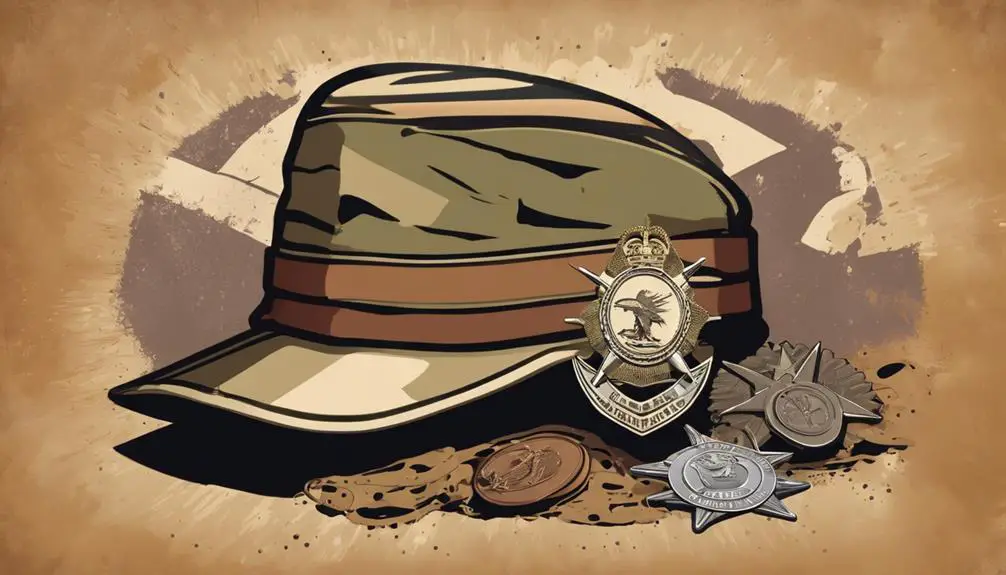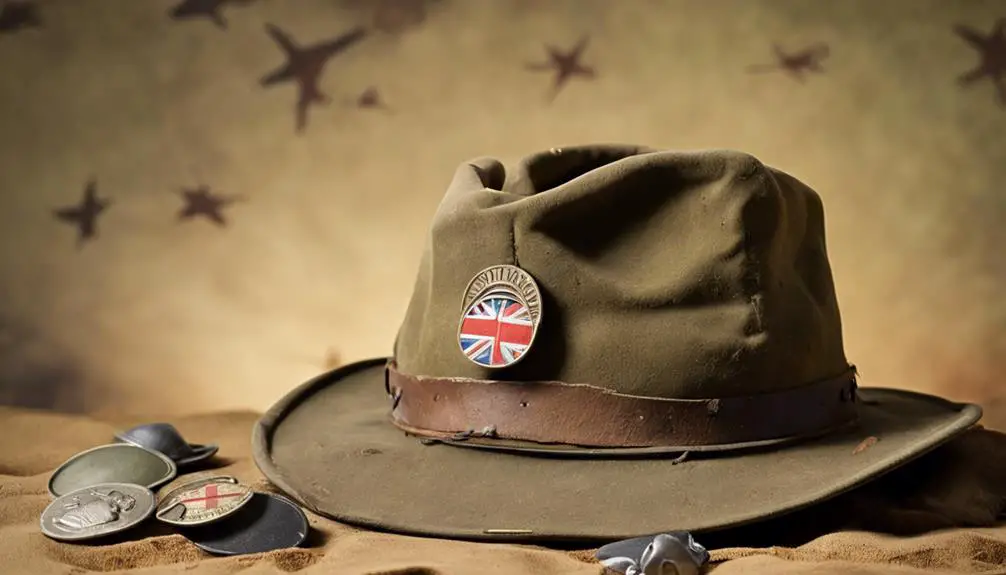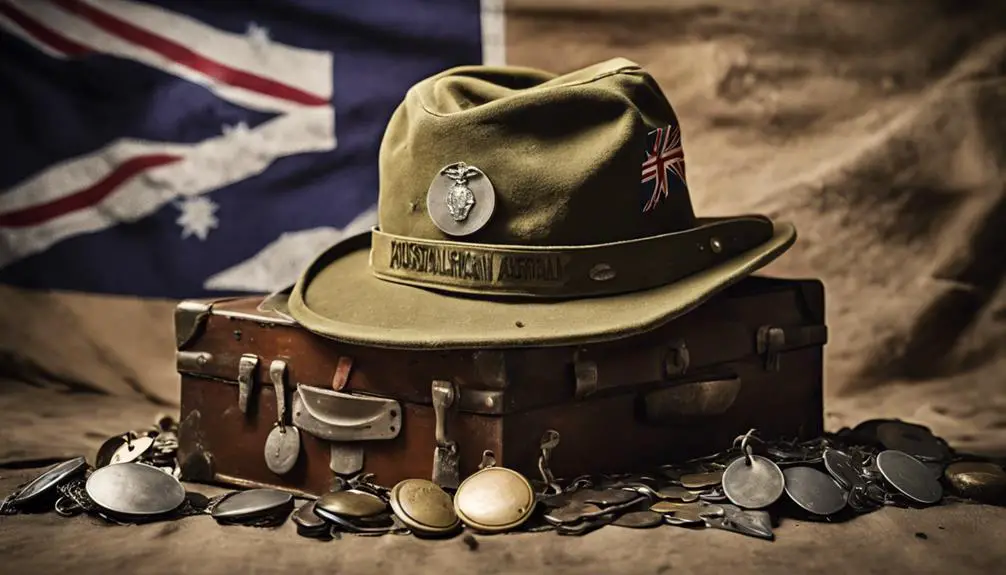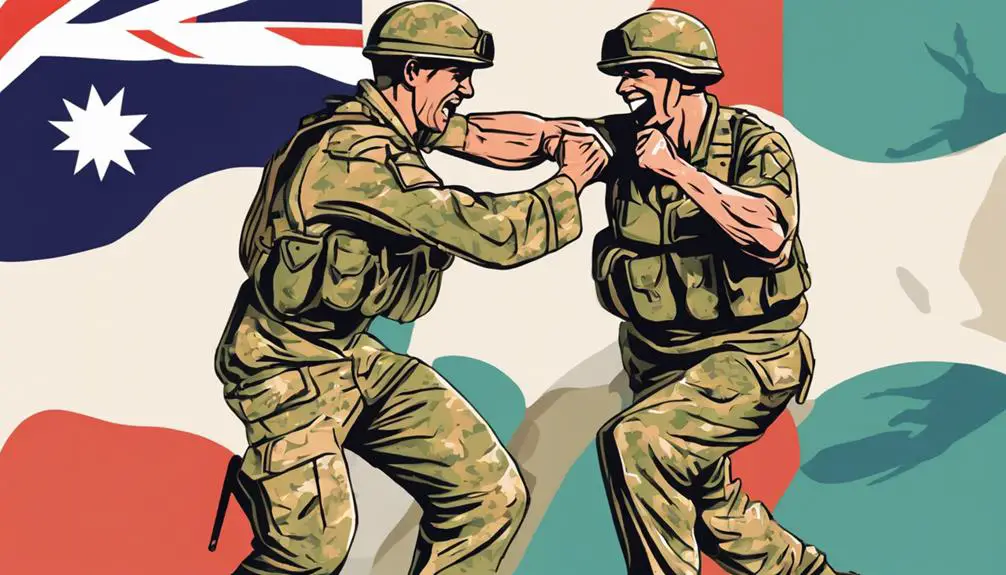You're about to discover the unique world of Australian military slang terms, shaped by the country's cultural identity and historical roots in World War I and II. These terms, borrowed from British military slang, foster camaraderie and unity among soldiers. As you explore this secretive language, you'll find insider terms like 'digger' and phrases like 'fair dinkum' used in casual conversations and official documents. To effectively communicate with ADF personnel, you'll need to understand these colloquialisms. As you venture further, you'll uncover more nuances of this fascinating language, and a deeper understanding of the Australian military's unique personality will start to unfold.
Aussie Military Lingo 101

You're about to start on a crash course in Aussie Military Lingo 101, where you'll learn to decode the unique slang used by Australian Defence Force personnel. This military jargon has its roots in the country's rich military history, with many terms dating back to World War I and II.
The slang's cultural significance lies in its ability to foster camaraderie and unity among soldiers, creating a sense of belonging and shared experience.
Understanding the origins of Aussie military slang is essential in deciphering its meaning. Many terms have been borrowed from British military slang, while others are uniquely Australian. The use of slang also reflects the cultural identity of the Australian Defence Force, which prides itself on its laid-back, no-nonsense attitude.
Slang for Insiders Only
Within the Australian Defence Force, certain slang terms are reserved for insiders, serving as a secret handshake that instantly identifies someone as part of the military community. These terms aren't widely known outside the military, and using them signals to others that you're part of the insider culture. You might hear them in casual conversations, emails, or even in official documents, but only if you're 'in the know.'
Here are a few examples of exclusive language that's unique to the Australian military:
- *Task-oriented* vernacular, like 'tasking' (assigning a mission) or 'de-tasking' (cancelling a mission)
- *Acronyms* like 'SOB' (Senior Officer Brief) or 'SITREP' (Situation Report)
- *Colloquialisms* like 'fair dinkum' (genuine or true) or 'she'll be right' (it's all good)
These terms are an integral part of the military's exclusive language, and using them correctly is a badge of honor. They evoke a sense of camaraderie and shared experience among those who've served.
Digger Slang Essentials

Mastering digger slang essentials is crucial for communicating effectively with Australian military personnel, as it reflects a deep understanding of their culture and values.
You'll find that Aussie military personnel take pride in their unique slang, which is deeply rooted in their warrior culture and Aussie identity. As you learn these essentials, you'll gain a deeper appreciation for the mateship and camaraderie that defines the Australian military.
Start with common terms like 'digger' (a soldier), 'squaddie' (a junior soldier), and 'CO' (Commanding Officer). Familiarize yourself with phrases like 'fair dinkum' (genuine) and 'she'll be right' (it's all good).
You'll also encounter colorful expressions like 'toodle-oo' (goodbye) and 'chin-wag' (casual conversation).
Military Jargon Decoded
Deciphering military jargon is an essential step in understanding the Australian military's unique communication style, which often blends technical terms with colloquialisms.
As you explore the world of Warrior Lingo, you'll discover that it's not just about using complex terminology, but also about understanding the nuances of communication within the military.
To crack the Codebreaker Secrets, you need to be familiar with the language used by Australian military personnel. Here are some key takeaways to get you started:
- Focus on context: Military jargon often relies on context to convey meaning. Pay attention to the situation and the people involved to better understand the terminology used.
- Learn the abbreviations: Australian military personnel use a lot of abbreviations to convey complex information quickly. Familiarize yourself with these abbreviations to stay ahead of the curve.
- Listen for colloquialisms: Military slang often incorporates colloquialisms and idioms that mightn't be immediately clear to outsiders. Listen for these colloquialisms to gain a deeper understanding of the language.
Unofficial Army Lexicon

You'll explore a vast array of unofficial terms and phrases in the Australian military's lexicon, which often vary across different units and regions. These colloquialisms are an integral part of the military's cultural identity, shaped by its rich military heritage and the unique experiences of its personnel.
As you dig deeper into the unofficial army lexicon, you'll notice that language evolution plays a significant role in shaping the military's slang. Terms and phrases are constantly being adapted, modified, or discarded as new generations of personnel bring their own influences and experiences to the fore.
The unofficial lexicon serves as a reflection of the military's cultural identity, with its own distinct flavor and character. It's a language that's often humorous, irreverent, and laced with irony – a tribute to the Australian military's unique personality.
As you explore this fascinating aspect of military culture, you'll gain a deeper appreciation for the complex dynamics that shape the language and customs of the Australian Defence Force.
Defence Force Colloquialisms
As you explore the Defence Force's colloquial language, you'll come across a range of colourful expressions that reflect the unique experiences and sense of humour of Australian military personnel. These colloquialisms are an integral part of the Defence Force's cultural identity and reflect the camaraderie and shared experiences of its members.
The language used by Australian military personnel is shaped by the country's rich military history and the unique challenges faced by its Defence Force. It's a language that's deeply rooted in the country's cultural identity and is characterized by a strong sense of humour and irony.
Some examples of Defence Force colloquialisms include:
- *Fair dinkum*, an expression used to emphasize the truth or authenticity of something
- *G'day*, a casual greeting used to acknowledge someone
- *Chock-a-block*, an expression used to describe something that's completely full or packed
Military Mates and Banter

In the Australian Defence Force, your mates are the ones who've got your back, and banter is the language that strengthens those bonds. You'll quickly learn that good-natured teasing is a way of life in the military. This type of banter is more than just joking around – it's a way to build trust and camaraderie among troops. These teasing rituals become camaraderie builders, helping to create a sense of belonging and shared experience.
As you go through training and deployments, you'll develop a thick skin and learn to dish it out as well as take it. Your mates will become like a second family, and the banter is a way to show affection and playful aggression. It's not uncommon to hear someone being called a 'galah' (a silly or annoying person) or told to 'harden up' (toughen up).
This type of banter is a way to relieve stress and create a sense of normalcy in high-pressure situations. So, be prepared to give as good as you get, and remember, it's all in the spirit of building strong bonds with your mates.
Unique Aussie Vernacular
Australian military slang is peppered with unique Aussie vernacular that's distinct from civilian language, and you're about to learn the lingo that'll make you sound like a true blue digger. This cultural identity is shaped by the country's history, geographic isolation, and linguistic evolution.
The Australian military's slang is a fusion of British, American, and indigenous influences, making it a distinct dialect that's both colorful and expressive.
Here are a few examples of the unique Aussie vernacular used in the military:
- Fair dinkum: an expression of agreement or confirmation, similar to 'true' or 'genuine'
- She'll be right: a phrase used to convey that everything will be okay or that a situation is under control
- Gobsmacked: an expression of shock or surprise, similar to being left speechless
These phrases, among many others, contribute to the rich cultural identity of the Australian military. By embracing this unique vernacular, you'll not only sound like a true Aussie digger but also gain a deeper understanding of the country's linguistic evolution and cultural heritage.
Frequently Asked Questions
Can Civilians Use Australian Military Slang in Everyday Conversation?
You're wondering if you can borrow military slang in everyday conversations. While cultural appropriation concerns arise, language evolution often stems from vernacular adoption.
Social acceptance plays a significant role in casual integration of military terms into civilian language. If used respectfully, it can enrich your communication.
However, be mindful of the context and avoid perpetuating stereotypes. By being thoughtful, you can incorporate military slang into your everyday conversations without disrespecting its origins.
Are Military Slang Terms Used Across All Australian Defence Forces?
As you explore the world of military lingo, you wonder if uniformity reigns supreme across all Australian Defence Forces. The answer lies in the nuances of each branch.
While Force integration aims to bridge gaps, branch distinctions and unit variations still exist. Rank differences and service nuances also play a role.
Uniformity standards are in place, but they're not rigidly enforced, allowing for subtle differences to emerge.
Do Australian Military Slang Terms Differ From British or American Slang?
When comparing military slang across countries, you'll find that historical comparisons and cultural influences play a significant role.
You'll notice that British and American slang terms often overlap, due to shared linguistic and cultural roots.
However, Australian military slang has developed distinct differences, shaped by the country's unique cultural identity and historical ties to both the UK and US.
Is Australian Military Slang Exclusively Used for Camaraderie Purposes?
Imagine being part of a tight-knit squad, where inside jokes and quirky phrases strengthen the bonds between you and your comrades.
You might think that military slang is solely used to foster camaraderie, but that's not entirely true. While it does promote unit cohesion and social bonding, its purpose extends beyond that.
Slang also serves as a tool for efficient communication, conveying complex ideas quickly and discreetly. So, while camaraderie is a significant aspect, it's not the only purpose of military slang.
Are There Any Australian Military Slang Terms Considered Offensive?
It's important to make an effort and recognize that some slang terms can be offensive, even if they're used in a lighthearted way. Terms that perpetuate cultural insensitivity or draw from a problematic historical context can be hurtful to certain groups.
Acknowledging the impact of words and avoiding the use of language that might offend or marginalize others is crucial. Be mindful of the language you use, and work towards creating an inclusive environment where everyone feels respected.
Conclusion
You've now got a grip on the Aussie military slang terms that'll make you sound like a true blue Digger.
You've decoded the jargon, mastered the colloquialisms, and can banter with the best of them.
You're a walking encyclopedia of Defence Force lingo, with a vocabulary that's as vast as the Outback itself.
Now, go forth and toss around terms like a pro – your mates will be as proud as a platypus in a billabong!






